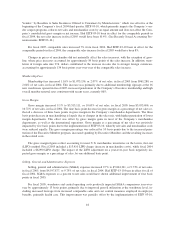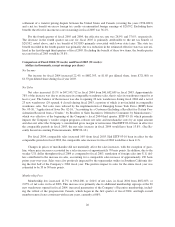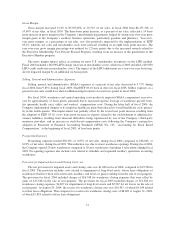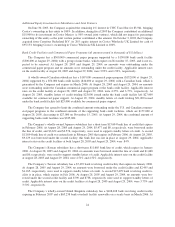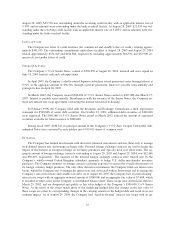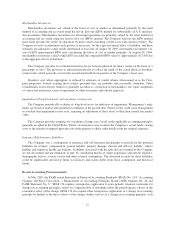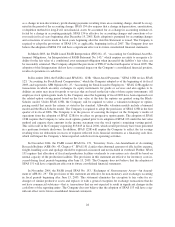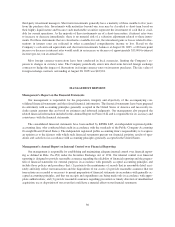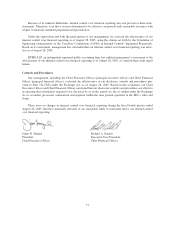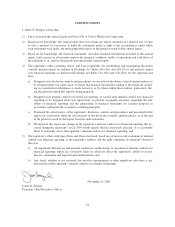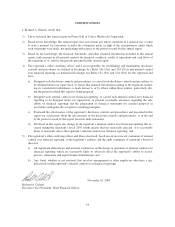Costco 2005 Annual Report Download - page 27
Download and view the complete annual report
Please find page 27 of the 2005 Costco annual report below. You can navigate through the pages in the report by either clicking on the pages listed below, or by using the keyword search tool below to find specific information within the annual report.gregate notional amount of $600,000 and an aggregate fair value of $25,754. In addition to the Company’s swap
on the 5
1
⁄
2
% Senior Notes noted above, the Company had entered into a swap on its $300,000 7
1
⁄
8
% Senior
Notes effective November 13, 2001, which was designated and qualified as a fair value hedge. The $300,000
7
1
⁄
8
% Senior Notes matured and were repaid on June 15, 2005. Concurrent to this transaction, the related swap
agreement expired.
Off-Balance Sheet Arrangements
With the exception of its operating leases, the Company has no off-balance sheet arrangements that have
had or are reasonably likely to have a material current or future effect on the Company’s financial condition or
consolidated financial statements.
Stock Repurchase Program
On November 30, 2001, the Company’s Board of Directors approved a stock repurchase program, authoriz-
ing the repurchase of up to $500,000 of Costco Common Stock through November 30, 2004. Under the program,
the Company could repurchase shares at any time in the open market or in private transactions as market con-
ditions warrant. The repurchased shares would be retired. On October 25, 2004, the Board of Directors renewed
the program for another three years. On June 7, 2005 the Company began repurchasing shares on the open mar-
ket. Through August 28, 2005 the Company has repurchased 9,205,100 shares of common stock at an average
price of $44.89, totaling approximately $413,252, including commissions.
Subsequent to the Company’s fiscal 2005 year end, August 29, 2005, the Board of Directors of Costco au-
thorized an additional stock repurchase program of up to $1,000,000 of Costco common stock. Under the pro-
gram, which contains no expiration date, the Company may repurchase shares at any time in the open market or
in private transactions as market conditions warrant.
Critical Accounting Policies
The preparation of the Company’s financial statements requires that management make estimates and judg-
ments that affect the financial position and results of operations. Management continues to review its accounting
policies and evaluate its estimates, including those related to revenue recognition, merchandise inventory,
impairment of long-lived assets and warehouse closing costs and insurance/self-insurance liabilities. The Com-
pany bases its estimates on historical experience and on other assumptions that management believes to be
reasonable under the present circumstances.
Revenue Recognition
The Company recognizes sales, net of estimated returns, at the time customers take possession of merchan-
dise or receive services. When the Company collects payment from customers prior to the transfer of ownership
of merchandise or the performance of services, the amount received is recorded as deferred revenue on the con-
solidated balance sheets until the sale or service is completed. The Company provides for estimated sales returns
based on historical returns levels.
The Company evaluates the criteria of the Financial Accounting Standards Board (FASB) Emerging Issues
Task Force (EITF) 99-19, “Reporting Revenue Gross as a Principal Versus Net as an Agent,” in determining
whether it is appropriate to record the gross amount of merchandise sales and related costs or the net amount
earned as commissions. Generally, when Costco is the primary obligor, is subject to inventory risk, has latitude
in establishing prices and selecting suppliers, influence product or service specifications, or has several but not
all of these indicators, revenue is recorded on a gross basis. If the Company is not the primary obligor and does
not possess other indicators of gross reporting as noted above, Costco records the net amounts as commissions
earned.
26




